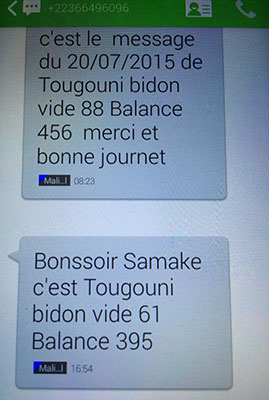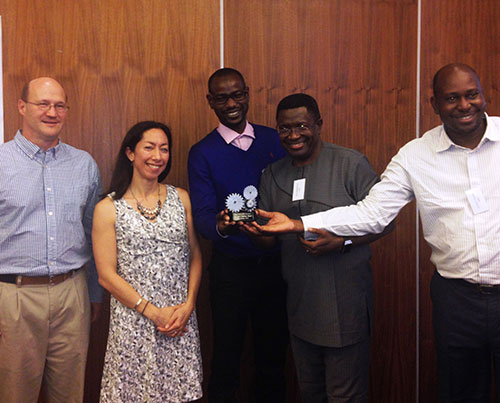The President’s Malaria Initiative’s (PMI) Africa Indoor Residual Spraying Project’s (AIRS) Mali country program was recently awarded the Grand Prize of PMI’s Innovation Challenge. AIRS Mali won the challenge for its innovation to better manage insecticide inventory. AIRS Mali designed an Access-based database system, known as the “e-inventory”, to provide a daily balance of all insecticides located in all secondary stores and two central warehouses.
The Prize came with an additional $50,000 in funds to enhance the country program’s work. The PMI contest invited PMI AIRS country programs to submit new technologies, implementation strategies, and partnerships that addressed challenges and/or presented improvements to implementing the PMI AIRS Project.

A daily text message the central warehouse manager receives from a secondary storekeeper on the balance of insecticide inventory.
In Mali, the Project relies on small secondary stores during the indoor residual spray campaign. These stores are not large enough to house the amount of insecticide needed to cover the entire spray campaign in a given geographical area. In addition, the risk of road incidents with insecticide is excessively high when transporting large quantities long distances or on roads difficult to navigate due to heavy rains.
The e-inventory, designed by the AIRS Mali M&E Manager, allows secondary storekeepers to send the daily balance of insecticide in stock to a central warehouse manager, who enters the information in the database. After all data is received, daily balances are reviewed against the targets established for the day and any deviations are reported to the AIRS Mali senior management team. Program managers can monitor the overall status of insecticide inventory and report projected shortages to the Project home office. At the central warehouse level, the system provides complete information on the insecticide, helping managers to avoid stock-outs and to timely dispatch additional insecticide to the secondary stores as needed.
At the end of the spray campaign, the database can quickly provide a total balance of all insecticide purchased for the campaign. The AIRS Mali team began using the system in Koulikoro region in 2013 and extended it to Baroueli in 2014.
Seven countries entered 15 innovations into the contest. Honorable mentions include AIRS Nigeria’s CDC Light Trap as a replacement to human landing catches, AIRS Madagascar’s Communalization Approach to IRS, and AIRS Senegal’s use of zip ties to identify whether homes have been sprayed.

